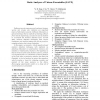Free Online Productivity Tools
i2Speak
i2Symbol
i2OCR
iTex2Img
iWeb2Print
iWeb2Shot
i2Type
iPdf2Split
iPdf2Merge
i2Bopomofo
i2Arabic
i2Style
i2Image
i2PDF
iLatex2Rtf
Sci2ools
131
click to vote
ACSAC
2004
IEEE
2004
IEEE
Static Analyzer of Vicious Executables (SAVE)
Software security assurance and malware (trojans, worms, and viruses, etc.) detection are important topics of information security. Software obfuscation, a general technique that is useful for protecting software from reverse engineering, can also be used by hackers to circumvent the malware detection tools. Current static malware detection techniques have serious limitations, and sandbox testing also fails to provide a complete solution due to time constraints. In this paper, we present a robust signature-based malware detection technique, with emphasis on detecting obfuscated (or polymorphic) malware and mutated (or metamorphic) malware. The hypothesis is that all versions of the same malware share a common core signature that is a combination of several features of the code. After a particular malware has been first identified, it can be analyzed to extract the signature, which provides a basis for detecting variants and mutants of the same malware in the future. Encouraging experi...
| Added | 20 Aug 2010 |
| Updated | 20 Aug 2010 |
| Type | Conference |
| Year | 2004 |
| Where | ACSAC |
| Authors | Andrew H. Sung, Jianyun Xu, Patrick Chavez, Srinivas Mukkamala |
Comments (0)

